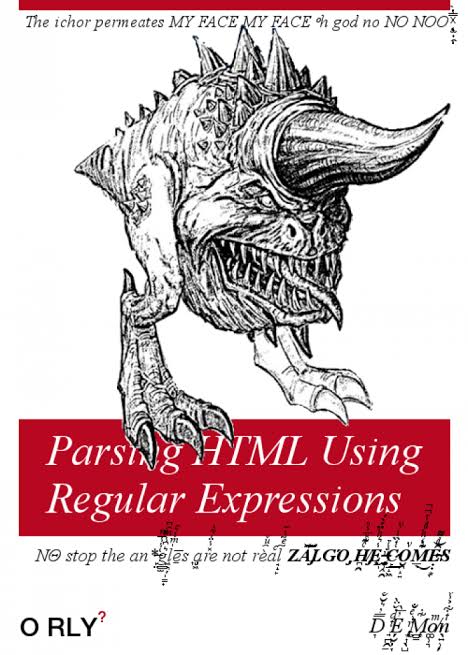
In the labyrinthine expanse of the digital cosmos, there lies a tale as ancient as the first line of code—a cautionary narrative about the folly of "Parsing HTML using Regular Expressions." This story, whispered in the shadowed recesses of developer forums and echoed through the hallowed halls of programming academies, serves as a stark reminder of the chaos that beckons to those who dare to tread this perilous path.
Our protagonist, Alex, a developer of considerable skill and curiosity, embarked on a quest that many before had deemed quixotic at best and heretical at worst. Armed with the belief that their prowess in regular expressions (regex) could tame the wild and unpredictable nature of HTML, Alex set forth to write the ultimate regex pattern, one that would parse HTML in a way that no developer had parsed before.
The journey began under a sky of binary stars, with Alex meticulously crafting their regex, a complex string of symbols and assertions that danced like arcane runes on their screen. "The ichor permeates MY FACE MY FACE oh god no NO NOO," became the mantra that haunted their efforts, a cryptic remnant of a cautionary tale found in an ancient developer's grimoire, warning of the madness that consumes those who attempt to parse the structure of HTML with the rigid tools of regex.
Yet, Alex pressed on, undeterred by the tales of woe and whispers of despair that accompanied their task. They believed themselves to be on the cusp of a breakthrough, poised to unveil a regex pattern so elegant, so powerful, that it would bend the HTML to their will, extracting elements and attributes with surgical precision.
But as the project progressed, the complexity of the task became apparent. HTML, with its nested elements and unpredictable formatting, defied the constraints of regex, slipping through the patterns like water through a net. The more Alex tried to capture the essence of HTML within their regex, the more elusive it became, a shape-shifting beast that mocked their efforts with a chorus of broken tags and jumbled content.
"No stop the angels are not real," whispered the void, a reminder of the hubris that led Alex down this path. The phrase, once nonsensical, began to take on a new meaning, symbolizing the folly of seeking order in the chaos of HTML with the ill-suited tool of regex.
In the end, Alex emerged from their quest not with the ultimate regex pattern, but with a profound understanding of the limits of their tools. They realized that some tasks, like parsing HTML, require tools designed to understand and navigate the fluid structure of markup languages—tools like HTML parsers that respect the inherent complexity and flexibility of the web.
The tale of "Parsing HTML using Regular Expressions: The ichor permeates MY FACE MY FACE oh god no NO NOO | No stop the angels are not real" became a legend in the digital cosmos, a cautionary tale that reminds developers of the dangers of overreaching, of the importance of choosing the right tool for the task at hand, and of the humility required to navigate the vast and unpredictable seas of code. It stands as a testament to the eternal truth that in the world of software development, wisdom often lies not in mastering the impossible, but in understanding the boundaries of our craft.